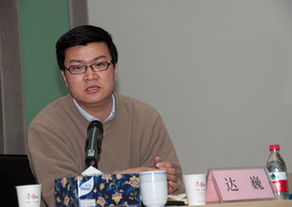
Da Wei, a scholar from the China Institute of Contemporary International Relations, are giving a speech at a seminar organized by China.org.cn to mark the 40th anniversary of Sino-U.S. relations on Feb. 23. [Photo by Chen Boyuan/China.org.cn]
Da Wei, a scholar from the China Institute of Contemporary International Relations, gave a speech on Feb. 23 in which he discussed U.S. President Barack Obama's "pivot" in relation to America's Asia-Pacific strategy. The speech was delivered at a seminar organized by China.org.cn to mark the 40th anniversary of Sino-U.S. relations. Six scholars participated in the seminar, sharing their views on bilateral relations between the two countries.
|
|
|
Da Wei, a scholar from the China Institute of Contemporary International Relations, are giving a speech at a seminar organized by China.org.cn to mark the 40th anniversary of Sino-U.S. relations on Feb. 23. [Photo by Chen Boyuan/China.org.cn] |
In this context, "Pivot" derives from a basketball tactic in which one foot remains fixed in place, allowing a player to change direction without moving the pivot foot in order to either pass or make a shot. The word is currently being used to describe America's strategy with regard to the Asia-Pacific region and it signifies the strategic importance of the region in terms of America's global strategy.
But is it a strategy predicated on containing China's rise within the region? Da Wei prefers "rebalance" to "containment", and in that sense he differs from other perspectives circulating in both the Chinese media and Chinese public opinion generally.
He explained that containment is used to describe a country's counter-expansion, much in the same way that a cup contains water. This is not, in fact, true of Sino-U.S. relations.
"When pondering this question, you need to consider the kinds of resources the U.S. is employing with regard to achieving its aims through this strategy," he said. "My conclusion was that, after I made a general comparison between political, economic and military investment, the U.S. is principally focusing on political investment in the Asia-Pacific region. That is to say, it is working to influence [U.S.] public opinion on the region. There is currently no investment-or big plans-in either of the other areas."
Discussing the future, Da Wei commented that as the Asia-Pacific region continues to grow in importance and China's influence further expands, Sino-U.S. relations will become more complex. If China and the U.S. become locked in a regional power struggle, we could see the dawn of a new Cold War, which would disastrous for both sides, and Da Wei already sees warning signs.
"A report by the Pentagon said that [U.S.] should develop her capability to counter China's counter-intervention capability," he said. "This means that they would not allow China to operate freely in the [Asia-Pacific] region. So in this respect, Sino-U.S. relations will see more tit-for-tat actions than optimistic progress."